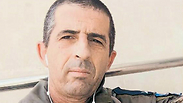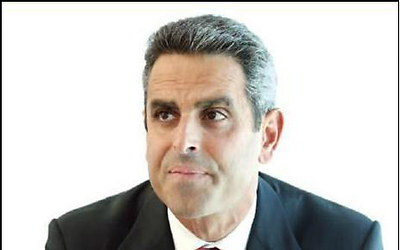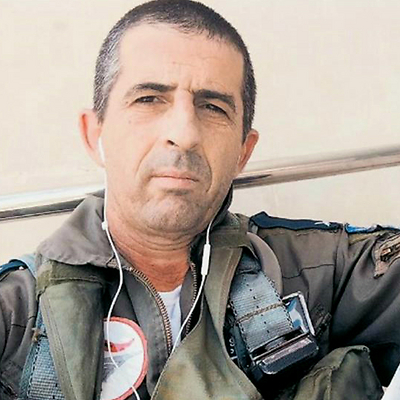
'It's a nightmare, but I just don’t see a better policy'
Two IAF pilots discuss the morality of the IDF, its determination to avoid civilian casualties, and what it is really like to be in the cockpit in wartime.
A number of Israel Air Force officers are up in arms over recent accusations that airstrikes in Gaza are immoral.
“I've gone on missions where non-combatants have been killed, leaving me deeply troubled,” says Colonel (res.) Ram Shmueli. “But if the choice is between missions that unfortunately affect noncombatants, and allowing our citizens to be killed, then the choice is clear.”
Lieutenant Colonel (res.) Tal Keinan also responded forcefully to what he sees as media indictment.
"Coming to reserve duty means taking personal risk, and taking on the moral burden of missions that challenge our conscience," he says. "This is in defense, among other things, of peoples’ right to write whatever they wish in the media – even unfounded criticism. That is democracy.”
“It is not much of a secret,” says Keinan, a former F-16 pilot. “Missions in Gaza are not popular in the fighter pilot community. We were trained for air battles against well-equipped enemies in far-off places. No one wants to target enemies embedded in neighborhoods, and bear the real risk of harming non-combatants. The ethical dilemmas that result from that are terrible. But I do not see a better way. Israeli civilians are under fire, and that is not a reality we can accommodate. Defense is the responsibility of any democratically elected government, and of the military that carries out its policy.”
Keinan is CEO of KCPS Clarity, the global investment firm and Israel’s first major exporter of financial services. Unknown to many, he originally came to Israel from the United States at the age of 20, enlisting in the Israel Air Force where until recently he served as a combat pilot.
Lieutenant Colonel Ram Shmueli, 54, has been a fighter pilot in the Israel Air Force for more than 36 years. His last mission in Gaza was six months ago. He has recorded more than 6,000 flight hours, including many missions across the Middle East.
“To succeed and to remain human,” is the code he operates by as a fighter pilot, including during the current conflict in Gaza. Married and a father of four, two of his sons are currently serving as combat soldiers - one in the Nahal Brigade's reconnaissance unit and one in the navy.
“I said to my boys, ‘It is your generation and now it is your turn'. Both are currently serving on the Gaza border. When I spoke to them, I had butterflies in my stomach but I didn't tell them that.”
Shmueli spent 30 years in the IDF, serving as the commander of a fighter squadron, the base commander at the Ramat David and Ovda Israel Air Force bases, and finally as head of an intelligence squadron during the 2006 Second Lebanon War. He is now retired from active duty but continues to serve as a combat pilot in the reserves, including taking an active role in recent operations.
“As a reserve pilot today, I instruct young pilots and navigators at flight school and in active operations, helping them to understand mission objectives and how to respond to unexpected challenges in real time,” he says.
After he was discharged, he helped establish civic organizations such as Hashomer Hahadash (“The New Guard") and Connecting – Building a Future Together (Mithaberim – Bonim Atid b’Yahad). A social entrepreneur and educator, in his spare time he also works in agriculture, growing olive trees and making olive oil.
In the past week, Shmueli has spent many hours on call on an Air Force base in the south of the country, training younger pilots for missions in Gaza. His training includes discussing the moral challenges involved in bombing urban areas.
“If I am in the air above Ashkelon and I move the nose of the plane a little in the direction of Gaza, in seconds I am there. A minute from home, I am in combat. These missions are all but taking place within our country. You have to understand, no pilot wants to conduct missions in one of the most densely populated areas in the world. And no other air force in the world takes as much care to avoid hitting innocent civilians as we do," he says.
"The situation is not easy but the moment our country is under attack, there are no dilemmas. If our children are reduced to hiding in bomb shelters, there is no reason we should not be using all methods at our disposal to remove the threat and eliminate those responsible. Rockets into our cities are an insufferable situation, one that no other country in the world would permit.”
Keinan elaborates further.
“I have friends in foreign air forces who think that the efforts we take to avoid civilian casualties are outrageous, bordering on irresponsible for a military tasked, first and foremost, with defending its own citizens. Let’s be clear: calling and sending text messages to civilians warning them to evacuate a structure, and instructing them on exactly where to go for safety, demands tremendous resources. How do you get the telephone numbers? How do you plot a route to safety for civilians in each individual circumstance? How do you communicate it clearly, in Arabic, so that the specific warning is actionable? Of course, you are also providing the enemy with actionable intelligence. The ‘Knock on the roof’ policy is not just a warning to civilians. It is also a statement to the enemy saying ‘This is what we plan to do in five minutes, and this is exactly where we plan to do it.’ This is obviously a questionable military tactic. It allows Hamas forces to remove rocket launchers from target structures, prepare ambushes for IDF forces, or as has been a deeply cynical modus operandi, send civilians into these structures, forcing us to abort important missions, or incur terrible consequences.
“During the wars in Iraq and Afghanistan, I cannot recall ever hearing of policies like these. Those conflicts produced civilian-to-combatant casualty rates of 3:1 and 4:1. The ratio in this conflict has been far lower. Any civilian death is a tragedy. One life is a whole world. One life is too many. But what exactly is the alternative? What other measures could we be taking in the face of cynical tactics specifically designed to maximize civilian casualties on both sides?”
No better option
Despite their extensive experience and conviction in the moral necessity of their actions, both Shmueli and Keinan admit there are missions that leave mental scars on the pilots involved.
“Years ago, an attack on the headquarters of an operative who was responsible for ongoing bus bombings in Israel produced unintended civilian casualties in a nearby home,” says Keinan. “The next day, Israeli newspapers carried a picture from the home of one of the dead, displaying a framed ‘Employee of the Month’ certificate that the man had earned for his work in a factory in southern Israel. That picture carried the weight of this ongoing tragedy for me. I could only envision this man, who was clearly proud of his association with people who happened to be Jews, as devoid of hatred. His death was an outrageous tragedy. I think about him every day.”
Both Keinan and Shmueli tell of many attacks that were aborted when they were already airborne to avoid hurting Palestinian civilians.
“During the Second Lebanon War, we were in the air when a civilian vehicle entered the target area,” Shmueli recalls. “At the last moment, at my own discretion, I diverted the bomb, putting the mission at risk. But we are given the authority to suspend a mission if civilian lives will be lost as a result.”
Keinan: “It is never simple. We are not flying these missions out of choice. They are necessary. Defense is a citizen’s right. It is our duty. The fact that, at the same time, we take extreme measures to prevent civilian casualties, is clear to our enemy. He sees this as a weakness to be exploited tactically. As we improve our countermeasures, his tactics become more cynical. What is going on in Gaza today is no less than Hamas intentionally causing Palestinian deaths. Whether the Israeli and international media report on this or not, it is exactly what is happening.”
In the pre-mission briefing, what do you know about the target?
Shmueli: "We are informed about all the details that we are going to attack. For example, it is important to know that if we are attacking a house that has weapons hidden underneath, we use a one-ton missile with a delay mechanism. Why? If we drop a regular missile on the house, it will destroy 20 neighboring houses. The way we work, we drop a missile that penetrates into the house and only detonates after several seconds delay, so that only the targeted house is destroyed. This is just one example of the precautions the Israel Air Force employs unlike any other air force in the world.”
Keinan: "There are planned missions from a defined bank of targets, where we know a tremendous amount about the target in advance. And there are mobile targets like rocket launchers, where we attack on very short notice. These tend to be the most urgent, but also the most dangerous. These tend to be where mistakes happen. What looks simple in a cockpit video is often very complex. There are many considerations beyond the target itself - weather, ground fire, timing and coordination, traffic (just avoiding collisions with other aircraft), aircraft systems operation, malfunctions, fear, stress, communications overload, and of course, proximity of civilians, international forces, and our own ground forces. It is all happening at once, and you don’t get to choose your timing.”
What do you see when you get to the target?
Keinan: “There are targets where, as a pilot, you cannot see what you are doing. You rely on a laser or other marker operated from the ground or from an unmanned aircraft to direct munitions to the target. In other cases, you need to see the target, either through aircraft instrumentation, or directly, with your own eyes.”
Why are there so many planes for so few defined targets?
Keinan: “The air force wants to have a variety of weapons available at all times. As an organization, it tries to tailor the mix of munitions to each individual target in real time, often specifically for collateral damage considerations. The result is an aerial traffic jam over the target area, with a lot of overlapping communications. It sounds like chaos, but it is actually tightly-choreographed.”
What goes through your head when you fire a missile?
Keinan: “When you are over target, the only thing that you have time to do is to focus on the mission. The moral wrestling comes before - and after.”
Shmueli: “The greatest threat when operating in Gaza is the threat of a mistake. In Syria or Lebanon, you have to be concerned over not getting hit by incoming fire. In Gaza, the main focus is not to make any errors. Everyone involved — the controller, the pilot and the navigator — is focused on not making any errors. All eyes are on the target.
“You need to remember that while there have been civilian deaths so far, over the course of the present operation 1,500 tons of missiles have been dropped on Gaza with nearly no mistaken identifications and very few missiles hitting the wrong target. That level of success is rare and difficult to achieve, and it reflects the focus of the system on avoiding errors. Everything involved is nothing like what people believe - that a pilot simply taps a button and releases a missile – it is a far more elaborate and involved system.”
What passes through your mind the second after your missile is released?
Shmueli: “After you release a missile over one of the most densely populated area in the world, many concerns run through your mind. It is not human to not have concerns. I have been on missions in which civilians, non-combatants, have been killed and I regret this deeply. But if the choice is between missions that unfortunately require hitting non-combatants or allowing our citizens to be killed, then the choice is completely clear. I choose defending my people.”
Keinan: “Over the years, there have been policies I have challenged. This is a democracy – a messy democracy, and we are not going to please all of the people all of the time. The reality is also much more complex than it sometimes looks, and clarity is a rare commodity in real time. On occasions, the outcomes of my missions have pained me and I know their impact will stay with me forever. Some of the dilemmas we contend with are terrible. But as rockets are fired on the civilian population of Israel, I have challenged myself to come up with a better policy than the current one, and I have failed. Short of peace, this is as good a balance between the conflicting responsibilities of defending our families and protecting innocent lives on the other side as I could construct.
Are there pilots that need and receive therapy?
Shmueli: “A psychologist is available to anyone who needs. We are soldiers and we share our feelings with each other. If someone needs a psychologist, it is a sign he is under extreme duress and it’s the right step that he seeks therapeutic help.”
Simply offensive
Shmueli and Keinan are well aware and have no problem with Israel's complete military superiority over Hamas. “We are a nation that enlists all of our resources in times of peace to build defensive systems like the Iron Dome,” explains Shmueli.
“Palestinian leaders, meanwhile, have by and large left their people in refugee camps for 66 years, in order to perpetuate their horrible reality. I have no problem with the fact that we enjoy military superiority. Our air force allows us to avoid sending in ground troops, although at times the latter are necessary as well. Both my sons serve in ground units and I know they are ready and very capable if called upon to engage enemy forces.”
What do you have to say to the eight Israeli pilots who announced that they will not do reserve duty. And to Haaretz columnist Gideon Levy who recently wrote an article entitled “Lowest deeds from the loftiest heights”?
Keinan: “Levy’s words may be offensive to some people, and I certainly think he is seriously uninformed, but we live in a democracy. Paraphrasing Evelyn Beatrice Hall, ‘I disapprove of what he says, but will defend to the death his right to say it.’”
Shmueli: “The Book of Deuteronomy writes about who is not permitted to go to war: A person who has planted an olive orchard, a person who is recently married, etc. The text finishes, 'And what of the man who is afraid and fainthearted? Let him go and return home and not make the heart of his brothers cowardly like his own.' It is criminal to soften the hearts of our troops during wartime - simply criminal! In terms of the pilots that declared they would not serve – the enemy hears them and our politicians bickering and this also weakens us tremendously. In my opinion, the greatest danger we face is the split and polarization of the nation and as a result, in my civilian life I am trying to organize an 'army' that can unite the state and the people. The challenge is how to ensure that the nation is not only united in times of war but also during peacetime.”













